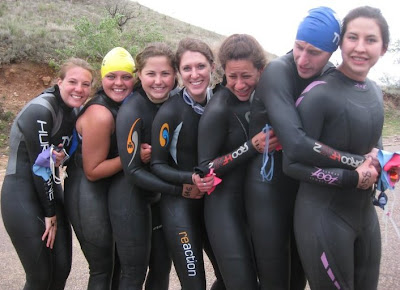Photo (from left): Katie Fabish, Nicole Sanders, Mindy Gross, Mae Hynes, Dana Corriere, David Farber, Holly Hull competing in the 2010 Collegiate Triathlon, Collegiate National Championship located in Lubbock, Texas.
It is important to eat breakfast in the mornings. After the body does not eat throughout the night, the body goes into starvation mode. When the body is in starvation mode, the metabolism slows, and the body retains as much nutrients as possible. By eating breakfast and introducing food for the day, the metabolism speeds up and weight loss is made possible.
2. Stay fueled.
Instead of eating 3 large meals a day, eat 4 to 6 small meals throughout the day. In eating smaller meals more frequently, the body uses most of the nutrients it takes in and refrains from storing extra calories. Another benefit of eating smaller meals throughout the day is that this type of eating will keep muscles fueled and ready for action!
· Large meals: Eat these three to four hours prior to exercise
· Small meals: Eat these two to three hours before exercising
· Small snacks: Eat these an hour before exercising
· Energy gels: Eat these during a workout, energy gels combine simple and complex carbohydrates to help the body maintain glucose levels during exercise.
Up to 60% of the human body is made up of water. Water is necessary for the function of organs and acts as the body’s cleansing system. Drink water before, during, and after a run.
· Before (2 hours prior): Excess water will pass through the urine prior to the start of your exercise.
· During: Excess water will be sweated off prior to reaching the kidneys.
· After: Re-hydrate after exercise to replenish your body.
The recommendation for an individual who is sedentary is 64 ounces per day, therefore, an individual who is physically active should consume more than that. You should aim to drink at least half of your body weight in fluid ounces of water each day.
· Balance proportions of carbohydrate, protein, fat.
- 40% from carbohydrates
- 30% from protein
- 30% from fat (mostly unsaturated)
· Increase carbohydrate consumption as training intensifies.
· Moderate calorific intake
· Increase fresh fruit and vegetables
· Moderate alcohol and coffee consumption
· Consume less sweets and junk food.
5. Snacks:
Eating a snack prior to and during exercise will help keep up blood sugar and prevent distracting hunger pangs. Prior and during to a race, healthy snack ideas may include:
· Energy bars or drinks
· Bananas or other fresh fruit
· Yogurt
· Fruit smoothies
· Whole-grain bagel or crackers with peanut butter
· Granola bars

Comments
Post a Comment